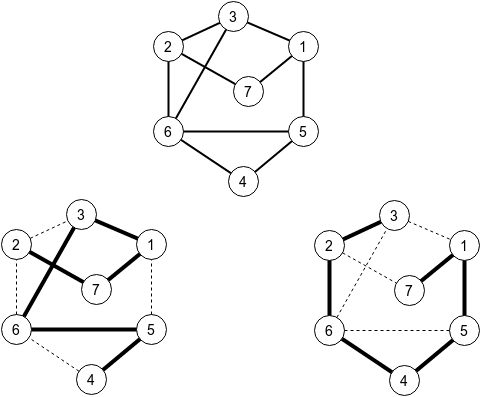CF643B.Bear and Two Paths
普及/提高-
通过率:0%
AC君温馨提醒
该题目为【codeforces】题库的题目,您提交的代码将被提交至codeforces进行远程评测,并由ACGO抓取测评结果后进行展示。由于远程测评的测评机由其他平台提供,我们无法保证该服务的稳定性,若提交后无反应,请等待一段时间后再进行重试。
题目描述
Bearland has n cities, numbered 1 through n . Cities are connected via bidirectional roads. Each road connects two distinct cities. No two roads connect the same pair of cities.
Bear Limak was once in a city a and he wanted to go to a city b . There was no direct connection so he decided to take a long walk, visiting each city exactly once. Formally:
- There is no road between a and b .
- There exists a sequence (path) of n distinct cities v1,v2,...,vn that v1=a , vn=b and there is a road between vi and vi+1 for
 .
.
On the other day, the similar thing happened. Limak wanted to travel between a city c and a city d . There is no road between them but there exists a sequence of n distinct cities u1,u2,...,un that u1=c , un=d and there is a road between ui and ui+1 for  .
.
Also, Limak thinks that there are at most k roads in Bearland. He wonders whether he remembers everything correctly.
Given n , k and four distinct cities a , b , c , d , can you find possible paths (v1,...,vn) and (u1,...,un) to satisfy all the given conditions? Find any solution or print -1 if it's impossible.
输入格式
The first line of the input contains two integers n and k ( 4<=n<=1000 , n−1<=k<=2n−2 ) — the number of cities and the maximum allowed number of roads, respectively.
The second line contains four distinct integers a , b , c and d ( 1<=a,b,c,d<=n ).
输出格式
Print -1 if it's impossible to satisfy all the given conditions. Otherwise, print two lines with paths descriptions. The first of these two lines should contain n distinct integers v1,v2,...,vn where v1=a and vn=b . The second line should contain n distinct integers u1,u2,...,un where u1=c and un=d .
Two paths generate at most 2n−2 roads: (v1,v2),(v2,v3),...,(vn−1,vn),(u1,u2),(u2,u3),...,(un−1,un) . Your answer will be considered wrong if contains more than k distinct roads or any other condition breaks. Note that (x,y) and (y,x) are the same road.
输入输出样例
输入#1
7 11 2 4 7 3
输出#1
2 7 1 3 6 5 4 7 1 5 4 6 2 3
输入#2
1000 999 10 20 30 40
输出#2
-1
说明/提示
In the first sample test, there should be 7 cities and at most 11 roads. The provided sample solution generates 10 roads, as in the drawing. You can also see a simple path of length n between 2 and 4 , and a path between 7 and 3 .
